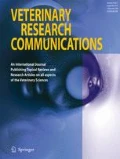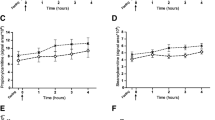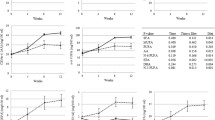Abstract
Canine aggressive behaviour is one of the most common problems being reported by dog owners. However, the biochemical basis of this phenomenon remains unclear. In humans, alterations in omega-3 plasma polyunsatured fatty acids and elevated omega6/omega-3 ratio have been linked to behavioural alterations, including aggression. Thus far, however, the relationship between plasma polyunsatured fatty acid status and aggression has not been investigated in the dog. In the present study we sought to investigate whether polyunsatured fatty acid status could be altered in plasma of pathologically aggressive Canis familiaris. Eighteen adult male German Shepherd dogs, aged 4.9 ± 0.9 years, showing no clinical signs but aggression, were investigated. Eighteen healthy male dogs, aged 4.8 ± 0.7 years, with a negative history of behavioural and neurological disorders served as controls. Baseline fasting plasma polyunsatured fatty acid composition was determined by gas chromatography. Compared to normal dogs, aggressive dogs showed lower docosahexaenoic acid (22:6 n-3) concentrations and a higher omega6/omega-3 ratio. In addition, they showed reduced cholesterol and bilirubin concentrations compared to their normally behaving counterparts. Altogether, our results suggest that low omega-3 fatty acids may adversely impact behaviour in dogs, resulting in greater propensity to aggression. However, given the cross-sectional design of our study, we cannot claim any causal relationship between the presence of alterations in fatty acid status and canine aggressiveness. Whether omega-3 fatty acids supplementation may be useful to reduce aggressive behaviour in the dog deserves further investigation.
Similar content being viewed by others
References
Buydens-Branchey, L., Branchey, M., McMakin, D.L. and Hibbeln, J.R., 2003. Polyunsaturated fatty acid status and aggression in cocaine addicts. Drug and Alcohol Dependence, 71, 319–323
DeMar, J.C., Ma, K., Bell, J.M., Igarashi, M., Greenstein, D. and Rapoport, S.I., 2006. One generation of n-3 polyunsaturated fatty acid deprivation increases depression and aggression test scores in rats. Journal of Lipid Research, 47, 172–180
Golomb, B.A., 1998. Cholesterol and violence: is there a connection? Annals of Internal Medicine, 128, 478–487
Golomb, B.A., Stattin, H. and Mednick, S., 2000. Low cholesterol and violent crime. Journal of Psychiatric Research, 34, 301–309
Hall, J.A., Picton, R.A., Skinner, M.M., Jewell, D.E. and Wander, R.C., 2006. The (n-3) fatty acid dose, independent of the (n-6) to (n-3) fatty acid ratio, affects the plasma fatty acid profile of normal dogs. Journal of Nutrition, 136, 2338–2344
Hallahan, B. and Garland, M.R., 2004. Essential fatty acids and their role in the treatment of impulsivity disorders. Prostaglandins, Leukotrienes and Essential Fatty Acids, 71, 211–216
Hallahan, B., Hibbeln, J.R., Davis, J.M. and Garland, M.R., 2007. Omega-3 fatty acid supplementation in patients with recurrent self-harm. Single-centre double-blind randomised controlled trial. British Journal of Psychiatry, 190, 118–122
Hibbeln, J.R., Umhau, J.C., George, D.T. and Salem, N. Jr., 1997. Do plasma polyunsaturates predict hostility and depression? World Review of Nutrition & Dietetics, 82, 175–186
Hibbeln, J.R., Ferguson, T.A. and Blasbalg, T.L., 2006. Omega-3 fatty acid deficiencies in neurodevelopment, aggression and autonomic dysregulation: opportunities for intervention. International Review of Psychiatry, 18, 107–118
Kaplan, J.R., Manuck, S.B. and Shively, C., 1991. The effects of fat and cholesterol on social behavior in monkeys. Psychosomatic Medicine, 53, 634–642
Kaplan, J.R., Shively, C.A., Fontenot, M.B., Morgan, T.M., Howell, S.M., Manuck, S.B., Muldoon, M.F. and Mann, J.J., 1994. Demonstration of an association among dietary cholesterol, central serotonergic activity, and social behavior in monkeys. Psychosomatic Medicine, 56, 479–484
Kitamura, Y., Ishida, Y., Takata, K., Mizutani, H., Kakimura, J., Inden, M., Nakata, J., Taniguchi, T., Tsukahara, T., Akaike, A. and Shimohama, S., 2003. Hyperbilirubinemia protects against focal ischemia in rats. Journal of Neuroscience Research, 71, 544–550
Mikkelsen, J. and Lund, J.D., 2000. Euthanasia of dogs due to behavioural problems: an epidemiological study of euthanasia of dogs in Denmark, with a special focus on problems of aggression. European Journal of Companion Animal Practice, 10, 143–150
Olsson, N.U., Shoaf, S.E. and Salem, N. Jr., 1998. The effect of dietary polyunsatured fatty acids and alcohol on neutrasmitters levels in rat brain. Nutritional Neuroscience, 1, 133–140
Sentürk, S. and Yalçin, E., 2003. Hypocholesterolaemia in dogs with dominance aggression. Journal of Veterinary Medicine Series A. Physiology, Pathology, Clinical Medicine, 50, 339–342
Song, J. and Wander, R.C., 1991. Effects of dietary selenium and fish oil (MaxEPA) on arachidonic acid metabolism and hemostatic function in rats. Journal of Nutrition, 121, 284–292
Sublette, M.E., Hibbeln, J.R., Galfalvy, H., Oquendo, M.A. and Mann, J.J., 2006. Omega-3 polyunsaturated essential fatty acid status as a predictor of future suicide risk. American Journal of Psychiatry, 163, 1100–1102
Vancassel, S., Blondeau, C., Lallemand, S., Cador, M., Linard, A., Lavialle, M. and Dellu-Hagedorn, F., 2007. Hyperactivity in the rat is associated with spontaneous low level of n-3 polyunsaturated fatty acids in the frontal cortex. Behavioural Brain Research, 180, 119–126
van den Berg, L., Kwant, L., Hestand, M.S., van Oost, B.A. and Leegwater, P.A., 2005. Structure and variation of three canine genes involved in serotonin binding and transport: the serotonin receptor 1A gene (htr1A), serotonin receptor 2A gene (htr2A), and serotonin transporter gene (slc6A4). Journal of Heredity, 96, 786–796
Author information
Authors and Affiliations
Corresponding author
Rights and permissions
About this article
Cite this article
Re, S., Zanoletti, M. & Emanuele, E. Aggressive dogs are characterized by low omega-3 polyunsaturated fatty acid status. Vet Res Commun 32, 225–230 (2008). https://doi.org/10.1007/s11259-007-9021-y
Received:
Accepted:
Published:
Issue Date:
DOI: https://doi.org/10.1007/s11259-007-9021-y




